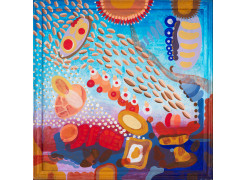Additional info:
Aref El Rayess occupies a defining position within the history of modern Lebanese art, distinguished by a practice that encompassed painting, sculpture, and critical reflection. Although self-taught, he trained in Paris under Fernand Léger and André Lhote, later studying etching with Johnny Friedlaender and sculpture with Ossip Zadkine at the Académie de la Grande Chaumière. His extensive travels across Senegal, Italy, and the United States profoundly shaped his artistic vocabulary, encouraging a sustained engagement with diverse materials, technologies, and cultural idioms. Upon returning to Beirut, he co-founded the Institute of Fine Arts at the Lebanese University and collaborated with Janine Rubeiz in establishing Dar el Fan, one of the most influential cultural platforms in Lebanon during the 1960s and 1970s. His visual language evolved from early expressionist compositions informed by African visual traditions to formally complex works influenced by Arte Povera, in which sand, oil pigment, and geometric motifs evoke the archaeology of memory and myth. Rayess remained deeply attuned to the socio-political climate of his time. His cycles Blood and Freedom (1971) and The Road to Peace (1976) interrogated the violence of the Lebanese Civil War and broader struggles across the Arab world, articulating a humanist critique of tyranny, materialism, and the superficial nationalism of postcolonial states. Parallel to this political dimension, his later desert-inspired landscapes conveyed a metaphysical serenity, where abstraction and luminosity expressed a spiritual sensibility rooted in his Druze background. In the 1980s, Rayess served as artistic consultant to the city of Jeddah, producing a number of monumental public sculptures commissioned by Mayor Mohammed Said Farsi, notably the twenty-seven-metre-high aluminium abstraction of the name Allah situated in Palestine Square. In his final years, he initiated the Aley Symposium of Painting and Sculpture, transforming the municipality into an open-air studio and fostering new dialogues around the role of art in public space. Recent retrospectives at Galerie Sfeir-Semler, Beirut (2021), and the Sharjah Art Foundation (2022) have reinstated Rayess as a pivotal figure in the articulation of a modern Arab aesthetic—one that mediates between political consciousness, spiritual reflection, and the materiality of form.
-
Gheorghe Ilea
b. Bucea, Romania, 1958 -
Max Hermann Maxy
Brăila, Romania, 1895 - Bucharest, Romania, 1971 -
Arthur Verona
Brăila, Romania, 1867 - Bucharest, Romania, 1946 -
Bassam Dahdouh
b. 1964 -
Karl Prantl
Pöttsching, Austria, 1923 - Pöttsching, Austria, 2010

